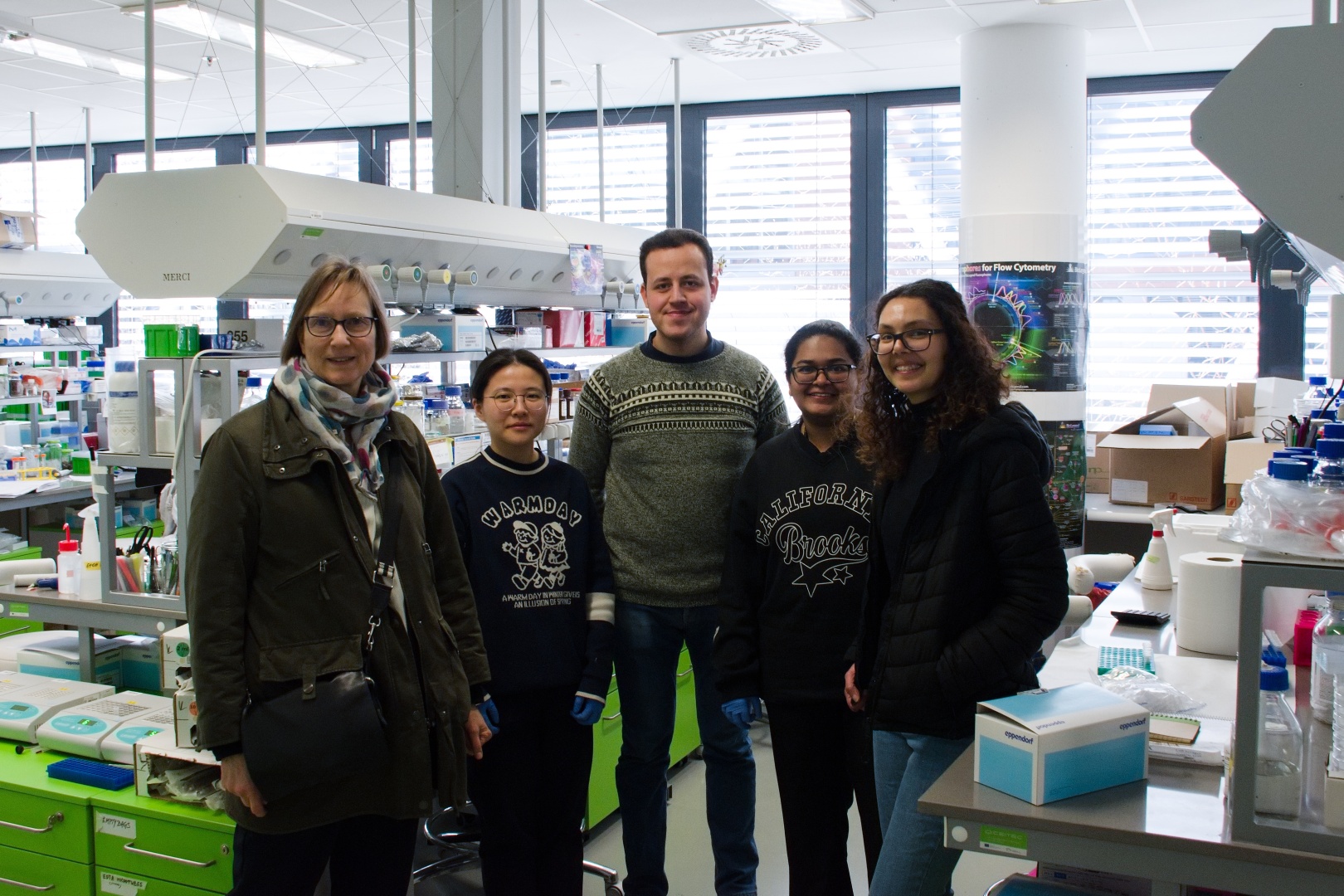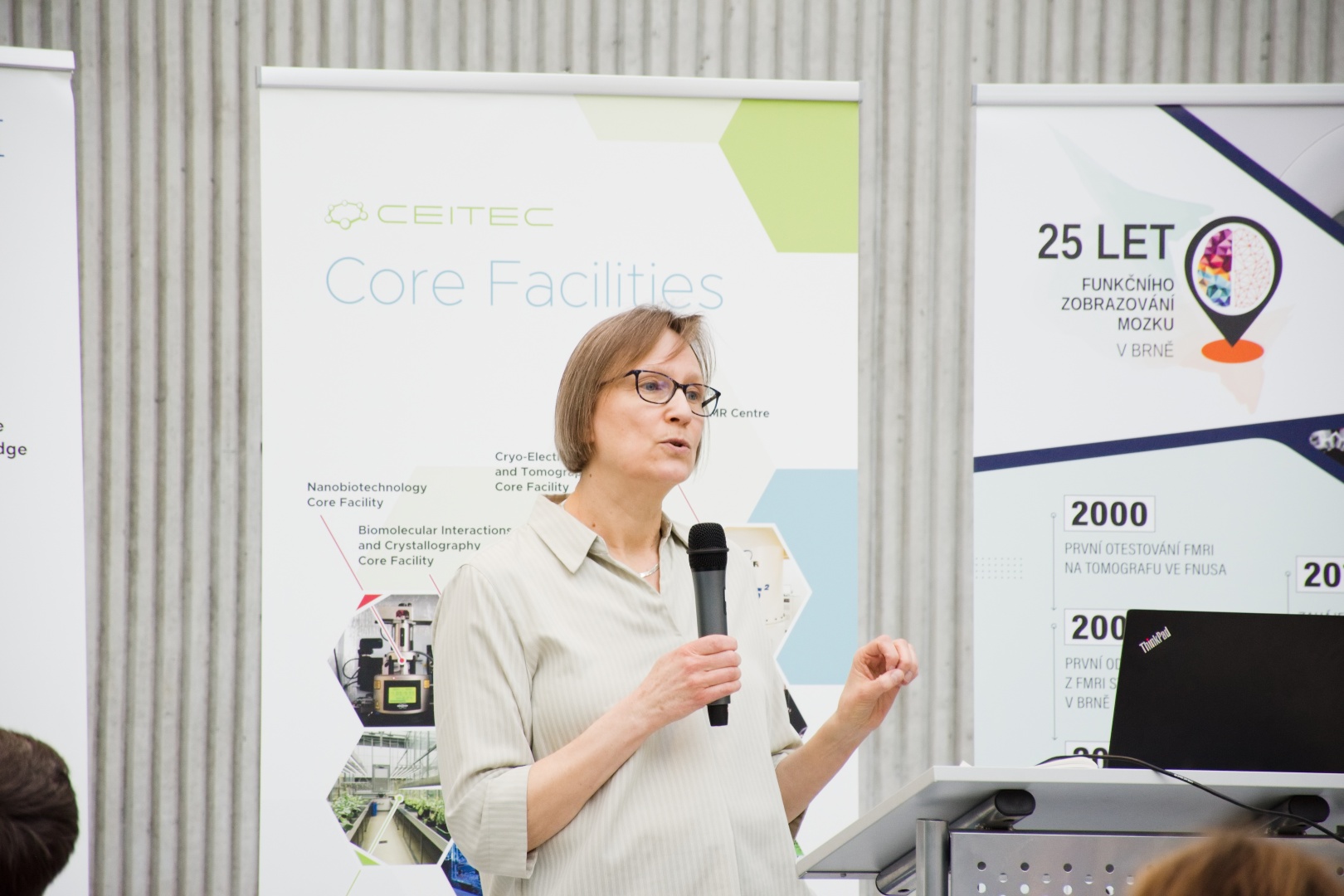26. Mar. 2025
A scientific career does not always mean working in a laboratory. So, what should a young researcher do if they love science but do not necessarily want to pursue it at the highest level? How can they channel their passion for science in other ways? One option is a career as a scientific editor. But what does this role entail, and how can one prepare for it? To find out first-hand, we invited Christina Karlsson Rosenthal, Chief Editor of Communications Biology, to CEITEC.
From Nature to Brno: Welcoming a scientific editor to CEITEC
Pavel Plevka, Director of CEITEC Masaryk University (MUNI), has long been committed to ensuring that early-career researchers have access to information about professions that allow them to shape the scientific landscape beyond academic research. With this in mind, we reached out to the editorial team of Communications Biology, a journal in the Nature portfolio, where a recent article by our structural virologists had just been published. We took this opportunity to express our gratitude for their collaboration and offered a chance to connect more closely with our institute.
Christina Karlsson Rosenthal, the journal’s Chief Editor, responded to our offer, expressing interest not only in meeting research group leaders but also in presenting the role of a scientific editor to postdoctoral researchers and PhD candidates. To ensure the visit was beneficial for her as well, we designed a program that introduced her to what we do in our research institute.
Lab tours and discussions with young scientists
 The primary audience for this visit were postdocs and PhD candidates, for whom the opportunity to meet an editor in person and ask questions about the editorial profession was invaluable. Members of our Postdoc Peer Committee took Christina to lunch and then guided her through their laboratories. Since Christina has a background in imaging techniques, we arranged visits to our specialized core facilities focusing on cryo-electron microscopy, cellular imaging, and nanobiotechnology.
The primary audience for this visit were postdocs and PhD candidates, for whom the opportunity to meet an editor in person and ask questions about the editorial profession was invaluable. Members of our Postdoc Peer Committee took Christina to lunch and then guided her through their laboratories. Since Christina has a background in imaging techniques, we arranged visits to our specialized core facilities focusing on cryo-electron microscopy, cellular imaging, and nanobiotechnology.
The program also included a session of our scientific TED-style talk, Sip of Science, where Christina observed junior researchers honing their presentation skills in front of an audience comprising colleagues from both research and administrative teams. Additionally, she gave a talk on the role of a scientific editor and the Nature journal portfolio, providing valuable insights for anyone considering this career path.
Career tips and insights from Christina Karlsson Rosenthal
During her visit, we took the opportunity to sit down with Christina and ask her a few questions:
What led you to transition from research to scientific editing? Was there a defining moment or realization that made you choose this path?
What led me away from research was a combination of limited long-term career opportunities in Sweden and personal circumstances—my husband received a permanent position in the UK, which made relocating the most viable option for our family. I didn’t have a clear path to a permanent academic role myself, so when we moved to London, I took some time to explore other options while also caring for our two young children. I accepted a nine-month position at a scientific journal, and to my surprise, I found that I genuinely enjoyed the work. That was the moment I realised this could be a fulfilling career path. It wasn’t a conscious decision to leave science, but rather a natural transition shaped by circumstance.
What key skills and qualities are essential for someone considering a career as an editor in a scientific journal?
If you're thinking about becoming a scientific editor, the first thing you need is a real interest in the profession and in science. But beyond that, it's a role that comes with quite a bit of responsibility. You're the one guiding papers through the publication process, making sure they’re solid, clear, and up to the journal’s standards. It helps if you’re someone who likes seeing things through to the finish line and can stay on top of several moving parts at once. Good communication skills are also key—you’ll be talking with authors, reviewers, and other editors regularly. And having a broad view of science, really makes a difference. It helps you quickly spot what’s exciting or important in a paper, even if it’s outside your original field.
What do you find most rewarding about your role as an editor? And conversely, what are the biggest challenges of this profession?
What I find most rewarding is being able to support authors throughout the publication process and seeing their papers improve and eventually get published. At Communications Biology, which is an author-focused journal, that sense of helping researchers get their work out into the world is especially fulfilling. Now, as Chief Editor, I also enjoy having a broader view of the journal’s content and mentoring our editorial team. Supporting my colleagues as they grow and develop their skills is a part of the job I truly value.
As for the challenges, one of the biggest is managing the workload. There are always many tasks competing for attention, so prioritisation and time management are essential. It takes time to find a good system that helps you stay on top of everything—especially if, like me, you also want to engage in special projects beyond day-to-day manuscript handling. And of course, authors often hope for decisions as quickly as possible, which adds another layer of pressure.
What first steps would you recommend to a young researcher interested in becoming a scientific editor?
For junior researchers interested in becoming scientific editors, the first step is to talk to people already working in the field. If you attend conferences or networking events, take the opportunity to speak with editors and learn about the different perspectives and paths into the profession.
It also helps to develop a broad scientific curiosity, as most journals cover a wider range of topics than any one lab or research project. Practicing how to quickly understand the key message of a paper and reading widely across disciplines are great ways to prepare.
So, there are no special strategies that could help them to break into this field?
No, I don’t think so. But some journals invite researchers to contribute short highlights or commentaries—those are excellent opportunities to gain experience. Similarly, getting involved in editing activities at your university or contributing to institutional blogs or newsletters can be a helpful start.
The last question has an overlap with science communication—with the rise of open-access publishing, more non-experts have access to primary research articles. Do you think this trend places new responsibilities on researchers and journals in terms of clarity and readability?
That’s a good question, and it’s something we’ve been discussing internally as well. With Open Access making scientific papers more widely available, there’s definitely a case to be made for improving readability and accessibility. For example, our sister journal Communications Medicine includes lay summaries, since medical research is often of direct interest to the general public. At Communications Biology, the content tends to be more specialised, so we haven’t implemented lay summaries yet—but it's certainly worth considering.
 That said, there are steps researchers can take to improve accessibility. If you're a junior researcher, try to get involved in the paper-writing process—not just the data, but in shaping the narrative, writing cover letters, and preparing the manuscript. It’s also helpful to participate in peer review, which sharpens your ability to evaluate clarity and scientific communication. Many early-career researchers are already doing this, and it's a great way to build both awareness and skills in communicating science effectively.
That said, there are steps researchers can take to improve accessibility. If you're a junior researcher, try to get involved in the paper-writing process—not just the data, but in shaping the narrative, writing cover letters, and preparing the manuscript. It’s also helpful to participate in peer review, which sharpens your ability to evaluate clarity and scientific communication. Many early-career researchers are already doing this, and it's a great way to build both awareness and skills in communicating science effectively.
Meeting Christina Karlsson Rosenthal was an inspiring experience for young researchers exploring alternative career paths in science. It demonstrated that the role of a scientific editor is dynamic, intellectually stimulating, and crucial for the academic community.


 Share
Share
